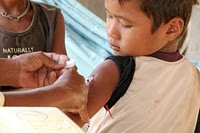Measles, a highly infectious viral disease, still poses a critical general well-being threat worldwide, despite being preventable through immunization. Mental well-being experts collectively agree that large-scale immunization crusades are critical to eradicating measles and preventing outbreaks. This paper explores the importance of these missions, the components that prevent measles, and the wider benefits of inevitable vaccination.
Catching measles
Measles is caused by a measles infection that is transmitted through respiratory droplets from the cuts or wheezes of infected people. The infection can remain airborne or live on surfaces for up to two hours, making it less often infectious. Side effects include high fever, runny nose, runny nose, red eyes and a typical rash that spreads over the body. The complications from measles can be extreme, including pneumonia, encephalitis (mind impairment) and even transition. Young children, pregnant women and people with weakened immune systems are particularly vulnerable.
Immunization work
Vaccination is the best measure to prevent measles. Measles immunization, usually administered as a feature of measles, mumps, and rubella (MMR) antibodies, initiates resistance by uncovering a safe framework for a weakened type of infection, provoking the body to produce antibodies without causing disease. These antibodies provide long-term insurance, reducing the likelihood of infection and the spread of measles.
The importance of immunization missions
Group resistance
One of the basic goals of inoculation crusades is to achieve group resistance. Mob invulnerability occurs when a critical portion of the population becomes resistant to a disease, either as a result of immunization or acquired disease, thereby reducing its spread. For measles, an exceptionally infectious disease, something like 95% of the population would have to be vaccinated to show herd immunity. This high vaccination coverage protects people who cannot be immunized, such as children under six months of age or people with specific diseases.
Avoidance episode
Immunization crusades are urgent in preventing measles outbreaks. In a population with low immunization rates, measles can spread rapidly, triggering episodes that strain medical care frameworks and threaten vulnerable populations. By guaranteeing widespread vaccination, these missions create a barrier against infection, prevent transmission, and contain expected episodes.
Annihilation Endeavors
Global immunization crusades have made major strides towards eradicating measles. The World Wellbeing Association (WHO) and the Unified Countries Youngsters' Asset (UNICEF) have implemented large-scale immunization programs that have resulted in significant reductions in measles cases and transmission worldwide. Continued immunization efforts are critical to achieving the ultimate goal of measles eradication, such as the prolific eradication of smallpox.
The difficulties of immunization missions
Notwithstanding the proven adequacy of measles immunization, several difficulties impede the progress of inoculation crusades.
Reluctance to immunize
Reluctance to immunize, driven by fraud and doubts about antibodies, presents a critical test. Deceptions about antibody security and spurious cases linking vaccination to mental illness have fueled a decline in vaccination rates in some districts. Vaccination reluctance through instruction, direct correspondence, and involvement in the local area is important to keep pace with high vaccination coverage.
Openness and foundation
In certain areas of the planet, especially low-wage and war-torn areas, access to vaccinations and medical care is limited. Strategic difficulties, including transportation, stockpiling, and dissemination of immunizations, can hamper vaccination efforts. Global aid and interest in the Medical Services Foundation are important to overcome these barriers and ensure that antibodies reach all people.
Political and social elements
Political upheaval, social agitation, and social beliefs can also affect vaccination crusades. In regions affected by conflict or with well-established social work, gaining local trust and cooperation can be problematic. Collaboration between state administrations, non-legislative associations and nearby pioneers is essential to explore these intricacies and ensure fruitful vaccine crusades.
Broader benefits of immunization
Past measles prevention, immunization crusades contribute to broader general welfare and cultural benefits.
Currency effect
Preventing measles through immunization reduces the medical costs associated with treating the disease and its complications. In addition, it reduces efficiency misfortunes caused by diseases, which contributes to financial stability and development. Putting resources into immunization is financially savvy, yields significant returns in terms of reduced consumption of medical services, and works for monetary efficiency.
Flexibility of general well-being
Vaccination crusades strengthen general well-being frameworks by further developing observation, medical care fundamentals, and crisis response capabilities. These upgrades generally improve overall well-being and allow better management of other irresistible infections and well-being crises.
Worked on personal satisfaction
By preventing measles and its complexities, immunization crusades act to personally satisfy people and networks. Better people lead to expanded educational fulfillment, efficiency, and social prosperity, and cultivate themselves in general cultural progress.
Conclusion
Immunization crusades are the basis of the fight against measles. By conducting group resistance, preventing flare-ups, and progressing toward destruction, these missions assume an essential role in protecting the general well-being. Addressing difficulties such as antibody reluctance, availability, and political elements is essential to ensure progress in vaccination efforts. The broader benefits of immunization extend to predicting past infection, contributing to financial strength, general well-being and contributing to personal satisfaction. Putting resources into and supporting vaccination crusades is an urgent step towards a better measles-free world.




.jpg)



.jpg)

0 Comments